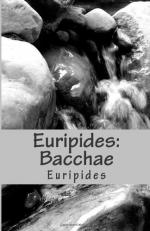
|
| Name: _________________________ | Period: ___________________ |
This test consists of 15 multiple choice questions and 5 short answer questions.
Multiple Choice Questions
1. Why does the first messenger not want to tell Pentheus the truth of what he saw?
(a) He didn't see anything.
(b) He fears Pentheus's delight.
(c) He doesn't know the truth.
(d) He fears Pentheus's rage.
2. Why did Pentheus "fall fainting?"
(a) He was overwhelmed.
(b) He was made to do so by the gods.
(c) He was poisoned.
(d) He was exhausted.
3. What is Thebes?
(a) A city-state.
(b) A state.
(c) A country.
(d) A region.
4. When DIonysus says, "Thy change of mind compels thy praise," with what tone does he say those words?
(a) Mockingly.
(b) Honestly.
(c) Praisingly.
(d) Happily.
5. What does the Chorus refer to as the "sure pledge of death" for Pentheus?
(a) Holding the fair Bacchic wand.
(b) Holding the fair serpent girdle.
(c) Holding the fair crown of leaves.
(d) Holding the fair golden chalice.
6. What do the women tie around their waists, according to the first messenger?
(a) Snakes.
(b) Ribbons.
(c) Leaves.
(d) Twine.
7. How does the Chorus think that a mortal man should "live out his day and night?"
(a) In sadness and sorrow.
(b) In happiness and lust.
(c) In purity and holiness.
(d) In prayer and song.
8. What does Pentheus hope to do when he leaves the palace in disguise?
(a) Retrieve his mother.
(b) Leave the city.
(c) Spy on the women.
(d) Find Dionysus.
9. A happy man, according to the Chorus, is one who from day to day has his life what?
(a) Full of surprises.
(b) Reach new levels.
(c) Follow tradition.
(d) Blest.
10. How does Dionysus promise Pentheus he will return to the city?
(a) In the arms of his mother.
(b) With much riches.
(c) Wiser in the ways of the gods.
(d) Dead.
11. What is Pentheus holding is his right hand?
(a) A sword.
(b) A thyrsus.
(c) A wine bottle.
(d) A crown.
12. Where does the first messenger say he comes from?
(a) Delphi.
(b) Athens.
(c) Cucluos.
(d) Cithaeron.
13. What reason did Dionysus give to the women when he ordered them to take their vengeance on Pentheus?
(a) For mocking their rites.
(b) For not believing in Dionysus.
(c) For trying to bring them home by force.
(d) For pretending to be a woman.
14. The Chorus extols the virtues of the simple man who lives within what?
(a) The social boundaries.
(b) The means of his life.
(c) The traditions of his people.
(d) The walls with his family.
15. The Chorus says that although their triumph is glorious, it ends in what?
(a) Fright and madness.
(b) Sorrow and pleading.
(c) Pleasure and pain.
(d) Sadness and tears.
Short Answer Questions
1. How did Pentheus die?
2. Who is supposed to be inspired by the Chorus's fourth ode?
3. How does the Chorus suggest they chant about the fall of Pentheus?
4. What form does the Chorus plead for Dionysus to show up in front of them as?
5. What part of Pentheus is his mother carrying to the city?
|
This section contains 475 words (approx. 2 pages at 300 words per page) |

|




